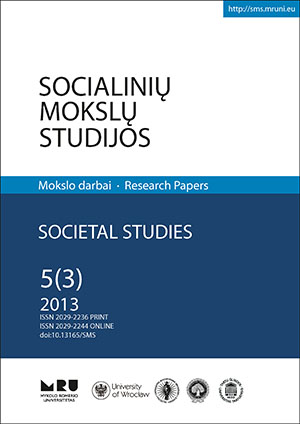Laidavimo sutarties ginčijimas: teorinės ir praktinės problemos
The Legal Grounds of Voidability of the Surety Contract: Theoretical and Practical Problems
Author(s): Jūratė KemežytėSubject(s): Social Sciences
Published by: Mykolas Romeris University
Keywords: suretyship; surety contract; voidability of surety contract; the legal grounds of voidability of surety contract; principal obligation; accessory obligation; economic interest of the surety
Summary/Abstract: During the last few years, unfair suretyships have come up as a topic on the European Community level. Unfair suretyship may be defined as suretyship entered into by non-professionals (often consumers) for the benefit of close relations or employers, whereby the surety has nothing to do with financial gains. Also, it may be defined as suretyship of shareholders, their spouses or even directors in order to secure small to medium size companies’ credits because it is all what such a company is able to offer to the creditor. The author analyzes the legal grounds of voidability of the surety contract in Lithuania, comparing them to foreign countries doctrine and case law. The author states that suretyships must be explored not only by law, but also by economics because suretyships make economic consequences as well as some recommendations on how suretyship law may be improved. Despite the fact that various legal grounds of voidability of the suretyship exist in different states, the research showed that it is quite impossible to make the suretyship voidable in Lithuania. First of all, there are no special legal grounds to void surety agreement and the case law on this issue is also incomplete. However, it is obvious that the existing case law does not meet the foreign practice because Lithuanian courts are not considering the economic interest of the surety and the disproportion of surety assets and liabilities as important as they are considered in foreign countries. Secondly, lower Lithuanian courts do not take into account the question of balance of interests of the borrower, the lender and the guarantor. Unfortunately, many cases do not pass the selection to the Supreme Court of the Republic of Lithuania that has to ensure uniform court practice of courts of general jurisdiction in Lithuania by means of precedents formulated in the cassation rulings. Thirdly, plaintiffs are often trying to make surety contracts voidable due to the lack of will or the lack of experience, which are subjective criteria, and it is hard to prove them, whereas courts tend to use objective bonus pater familias criteria. Therefore, to prove the legal grounds for the plaintiff is even more difficult. It must be noticed that the plaintiffs do not exercise their procedural rights properly as well, e.g., they do not try to use Article No. 1.81 of the Civil Code of the Republic of Lithuania (contracts contrary to public policy or good morals) or Article No. 3.85 of the Civil Code of the Republic of Lithuania, which could be an appropriate basis for them. Also, the plaintiffs do not tend to claim for contracts’ amendments. The author states that besides the economic interest of the surety and the disproportion of surety assets and liabilities, economic efficiency should be considered as one of the factors justifying legal intervention to contractual relationships.
Journal: Socialinių mokslų studijos
- Issue Year: 5/2013
- Issue No: 3
- Page Range: 903-926
- Page Count: 24
- Language: Lithuanian

